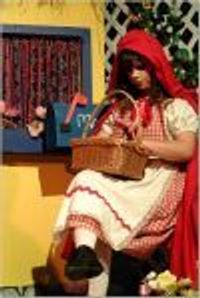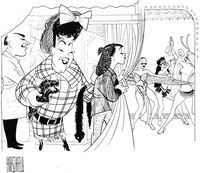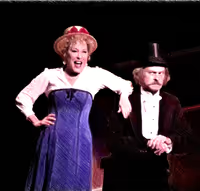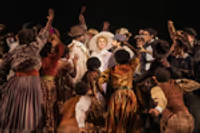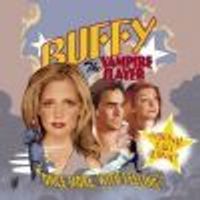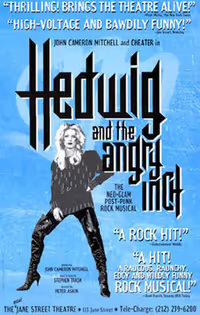20 Broadway Shows that Everybody Should Know Well
AwesomeDanny
Broadway Legend Joined: 7/30/09
#2520 Broadway Shows that Everybody Should Know Well
Posted: 8/9/10 at 4:16pmI think we have some good lists, but I want to know what are twenty flops that we all should know? I'm familiar mostly with more recent flops (and of course, Carrie), but if you had to make a list of the twenty most important flops, what would they be? Let's define a flop as a show playing less than 150 performances.
TrpleThreat89
Understudy Joined: 8/9/10
#2620 Broadway Shows that Everybody Should Know Well
Posted: 8/9/10 at 5:25pm
I like the idea of 20 flops. There are far too many amazing musicals to simply narrow it down to 20 - something important will be left out.
I'm only 21 so I am most familiar with recent flops.
Anyone Can Whistle
Merrily We Roll Along
Candide
Carrie
Sweet Smell of Success
Glory Days
9 to 5
A Catered Affair
Cry-Baby
A Tale of Two Cities
Little Women
The Pirate Queen
Lestat
High Fidelity
The Woman in White
Caroline or Change
Urban Cowboy
Taboo
Thou Shalt Not
The Adventures of Tom Sawyer
Updated On: 8/9/10 at 05:25 PM
#2720 Broadway Shows that Everybody Should Know Well
Posted: 8/9/10 at 6:24pm
1. Les Miserables
2. Rent
3. Hello Dolly
4. West Side Story
5. Phantom of the Opera
6. Mamma Mia
7. Fantastiks
8. Pirates of Penzance
9. The Producers
8. Sound of Music
9. Fiddler on the Roof
10.Sweeney Todd
11.South Pacific
12.Chicago
13.Grease
14.Anything Goes
15.Gypsy
16.42nd Street
17.Ragtime
18.Guys and Dolls
19.Singin in the Rain
20.Oklahoma
husk_charmer
Broadway Legend Joined: 10/19/06
#2820 Broadway Shows that Everybody Should Know Well
Posted: 8/9/10 at 6:40pm
I think anyone who makes a list and leaves "Chorus Line" out (Yes, Jordan, even you) is absolutely stupid.
Chorus Line, aside from being the longest running American musical, it TOTALLY revolutionized the creation of the musical with the introduction of workshopping. It's also got the most prime example of musical theatre hierarchy. That being, when the emotion is heightend, you sing, and when words are no longer enough you dance. It's so brilliantly charted with "Music and the Mirror."
jagfkb
Broadway Legend Joined: 5/29/07
#2920 Broadway Shows that Everybody Should Know Well
Posted: 8/9/10 at 8:07pm
(In no particular order):
Sunday in the Park with George
Ragtime
Next to Normal
Title of Show
Bloody Bloody Andrew Jackson
Once on This Island
Urinetown
Pippin
Rent
Spring Awakening
1776
Promises, Promises
A Little Night Music
Sweeney Todd
Gypsy
Passing Strange
Hair
Legally Blonde
Wicked
Into the Woods
#3020 Broadway Shows that Everybody Should Know Well
Posted: 8/9/10 at 8:18pm
If a theatre professor is teaching Wicked as one of the classics they need to be fired and banned from teaching.
#3120 Broadway Shows that Everybody Should Know Well
Posted: 8/9/10 at 8:28pmilovebroadway, I'd recommend picking up a few of Ethan Mordden's books. Especially the 40's ("Beautiful Mornin"), 50's ("Everything's Coming Up Roses), 60's ("Open a New Window"), and 70's ("One More Kiss").
husk_charmer
Broadway Legend Joined: 10/19/06
#3220 Broadway Shows that Everybody Should Know Well
Posted: 8/9/10 at 8:35pmBe careful, Mordden doesn't always fact check too well....
#3320 Broadway Shows that Everybody Should Know Well
Posted: 8/9/10 at 8:40pmExample? I consider his books well-researched.
husk_charmer
Broadway Legend Joined: 10/19/06
#3420 Broadway Shows that Everybody Should Know Well
Posted: 8/9/10 at 8:44pmHonestly, it's been so long since I read one, that nothing specific stands out. I just remember reading One More Kiss (that's the 70's right?) and going "This isn't right...neither is this...or this!"
#3520 Broadway Shows that Everybody Should Know Well
Posted: 8/9/10 at 8:46pmRead them several times and never seen any glaring factual errors. And considering you can't remember any of them, they obviously weren't that significant, if even incorrect in the first place.
husk_charmer
Broadway Legend Joined: 10/19/06
#3620 Broadway Shows that Everybody Should Know Well
Posted: 8/9/10 at 9:06pm
Ok, so I pulled out "The Happiest Corpse I've Ever Seen" (got it as a gift, never read it) and am skimming through. First thing, during his discussion of "La Cage" he never gives a character name, just the actors. This would be fine, except he then uses an excerpt from the script, using the actor's last name instead of the character's name. I find that a bit odd. Especially since later he uses an excerpt from "Collete Collage" and uses character names.
I really wish I had "One More Kiss" still, b/c it really was a continual stream. Enough so that I stopped reading.
#3720 Broadway Shows that Everybody Should Know Well
Posted: 8/9/10 at 9:12pmThat's not a factual error, it's a writing style choice. He does that in all his books. I think he knows his average reader has a certain amount of knowledge going in, like character names in well know musicals. They aren't exactly idiot proof reading. He knows his audience and doesn't dumb things down for them.
#3820 Broadway Shows that Everybody Should Know Well
Posted: 8/9/10 at 10:18pm
Wow, it's a sad commentary on Broadway that you asked for 20 Broadway shows and almost nobody picked a single play .. as opposed to musical.
Really pathetic.
If you want good theatre nowadays - Broadway is the last place to look.
But more so, if you want people knowedgeable about theatre, it's not a Broadway audience. They just want shows they already know the plots of and musicals of movies they have seen.
#3920 Broadway Shows that Everybody Should Know Well
Posted: 8/9/10 at 10:36pmProbably because the OP said they were majoring in musical theatre.
#4020 Broadway Shows that Everybody Should Know Well
Posted: 8/9/10 at 10:48pm
Rent
Phantom
Gypsy
Sweeney Todd
Cabaret
The King and I
Les Miserables
West Side Story
Company
South Pacific
Oklahoma!
Chicago
Fiddler on the Roof
Evita
Hair
Ragtime
Nine
Camelot
Into the Woods
Carousel
#4120 Broadway Shows that Everybody Should Know Well
Posted: 8/10/10 at 12:06am
South Pacific
Wicked
Sound of Music
West Side Story
Phantom of the Opera
Gypsy
Little Night Music
Carousel
Les Miserables
Annie
La Cage Aux Folles
Billy Elliot
Oklahoma
Bye Bye Birdie
Cats
Funny Girl
Fiddler on the Roof
Hairspray
The Music Man
42nd Street
#4220 Broadway Shows that Everybody Should Know Well
Posted: 8/10/10 at 12:43am
Carousel
A Chorus Line
August Osage County
The Homecoming (Actually any Pinter play)
Caroline or Change
Angels In America
Sweeney Todd
Merrily We Roll Along
Company
Doubt
Parade
Carrie
Follies
West Side Story
Who's Afraid of Virginia Woolf
RENT
Phantom of the Opera
CATS
Showboat
Wicked
Les Miserables
Books:
The Season
A Chorus Line and the Musicals of Michael Bennett
The Happiest Corpse I've Ever Seen
Everthing Was Possible: The Birth of the Musical Follies
Stephen Sondheim: A Life
Free For All: Joe Papp, The Public and the Greatest Theater Story Ever Told
#4320 Broadway Shows that Everybody Should Know Well
Posted: 8/10/10 at 2:08am
Show Boat
Oklahoma
Carousel
Hello Dolly
West Side Story
Gypsy
Hair
JC SuperStar
Rent
Company
Follies
Sunday in the Park with George
Chicago
Cabaret
How to Succeed
Fiddler on the Roof
South Pacific
Stop the World I want to Get Off
Guys and Dolls
Falsettos
The Music Man
My Fair Lady
Get the book No Legs, No Jokes, No Chance: A History of the American Musical Theater by Sheldon Patinkin. It is the best history lesson on Musical Theater.
Updated On: 8/10/10 at 02:08 AM
#4420 Broadway Shows that Everybody Should Know Well
Posted: 4/6/14 at 8:20am
Phantom - most successful piece of entertainment of all time
Longest running doesn't necessarily mean most successful. Wouldn't THE LION KING be the most successful, as it is the highest grossing in Broadway history? Last year it became the first to gross over $1,000,000,000 since it opened.
#4520 Broadway Shows that Everybody Should Know Well
Posted: 4/6/14 at 8:53am
Guys and Dolls
Oklahoma
Cabaret
CATS
Les Miserable
Hello Dolly
A Chorus Line
Fiddler on the Roof
My Fair Lady
South Pacific
Chicago
Phantom of the Opera
Into the Woods
Gypsy
Next To Normal
Company
Rent
Music Man
Sweeney Todd
Evita
#4620 Broadway Shows that Everybody Should Know Well
Posted: 4/6/14 at 11:41am
Hard question because it can be interpreted in so many ways. Some shows are more important for composers to know; others are more important for librettists to know, others for producers to know; others for, respectively, designers, aficionados, performers, investors, scholars, etc.
Some shows people should know well because they are so damned good and illustrate what the form can do at its best. Some shows people should know well because they are extremely successful. Some shows people should know well because they were truly innovative. Some shows people should know because they are deemed innovative, which is, in many respects, as important as being truly innovative. Some shows people should know well because of why they failed artistically. Other shows people should know well because of why they failed financially.
And I could go on and on.
One thing's for sure, though. I'd have trouble reducing the list to 20.
Updated On: 4/6/14 at 11:41 AM
MNC77
Stand-by Joined: 5/5/13
#4720 Broadway Shows that Everybody Should Know Well
Posted: 4/6/14 at 12:10pm
The link below gives a solid list and some explanation behind what makes the shows important to the history of Broadway
http://www.playbill.com/news/article/189335-Game-Changers-The-Broadway-Musicals-That-Shaped-the-Art-Form/pg1
Updated On: 4/6/14 at 12:10 PM
bobs3
Broadway Legend Joined: 4/8/12
#4820 Broadway Shows that Everybody Should Know Well
Posted: 4/6/14 at 3:40pm
There aren't just musicals:
A Streetcar Named Desire
Death of a Salesman
Long Days Journey Into Night
Angels in America
The Odd Couple
The Crucible
The Glass Menagerie
The Piano Lesson
A Raisin in the Sun
Picnic
All the Way Home
Night of the Iguana
Fences
Anna Christie
Our Town
Harvey
A Delicate Balance
Who's Afraid of Virginia Woolf?
M. Butterfly
August: Osage County
ARTc3
Broadway Star Joined: 8/5/13
#4920 Broadway Shows that Everybody Should Know Well
Posted: 4/6/14 at 4:58pm
I am extremely thankful for frontrowcentre2's post as s/he pointed out that many of the "reasons" were inaccurate. I was truly surprised as to some of the explanations that were given as to why a "show" is/was important.
Of course, what concerns me more, is that someone reading this thread will believe some of these inaccuracies and perpetuate the falsehoods.
Having typed the above, many of the lists here are excellent.
Also, I too was wondering why only a very few included plays. I wonder if the word "show" in context to "Broadway" implies musical. Hmmm?
Videos


